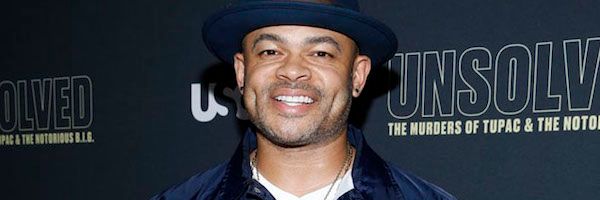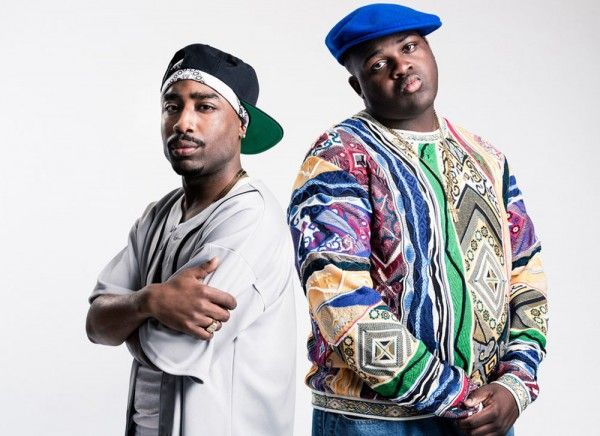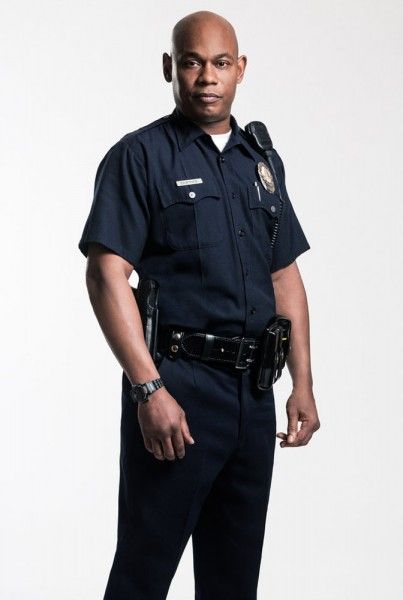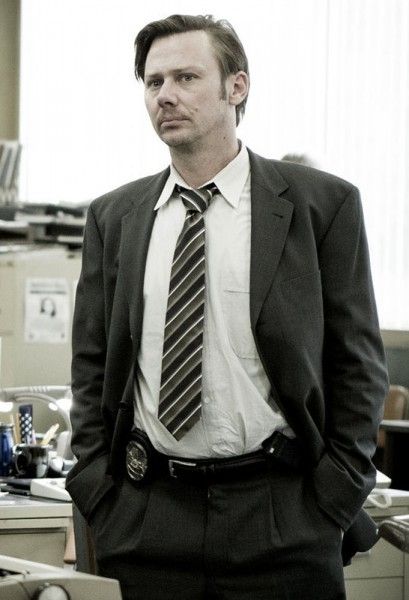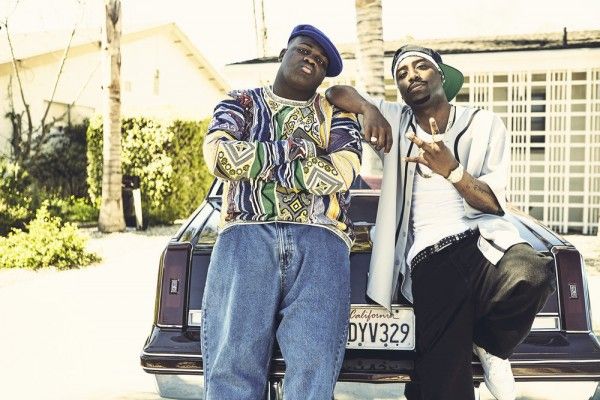From show creator Kyle Long and executive producer/director Anthony Hemingway, the USA Network series Unsolved: The Murders of Tupac and the Notorious B.I.G. has been a deeply personal, 10-hour exploration of the lives, friendship and murders of rap legends Tupac Shakur (Marcc Rose) and Christopher Wallace, aka The Notorious B.I.G. (Wavyy Jonez). The limited series dove into the dual police investigations, of Detective Greg Kading (Josh Duhamel) in 2006 and Detective Russell Poole (Jimmi Simpson) in 1997, to look for truth behind the conspiracies.
During this 1-on-1 phone interview with Collider, Anthony Hemingway, who has amassed quite a resume, as a TV director, talked about why he was compelled to have a hand in telling the story of Unsolved, telling the very human story of who Tupac and Biggie were, feeling like they were able to achieve the mission, and why he hopes we can learn from what’s reflected in it. He also talked about what made him want to direct the pilot for The Purge TV series, doing the CBS pilot for Murder with Michael Chiklis, and why he’d also like to direct another feature film (his last was Red Tails, out in 2012).
Collider: Thank you for chatting with me! I’m a big admirer of your work!
ANTHONY HEMINGWAY: Thank you! That’s awesome! Lovely of you to say that.
Obviously, there have been previous film and TV projects that have tackled Tupac and Biggie, to varying degrees of success, but something about the telling of their story in Unsolved feels different. What compelled you to approach it from this angle? Did you feel that there was something different about this telling about of their story, from the beginning?
HEMINGWAY: Yeah. The first time I read (creator) Kyle Long’s script, it was very apparent to me that this is a man who is extremely talented in writing and who has a moral compass that I respect and that aligns with who I am, as a person as well as an artist. He’s someone who cares about the human condition. It was obvious that there was pure definitive intention and desire to tackle this the best that we could and dive into the layers of their humanity in a way that we’ve never seen before. That was exciting for me. I frequently say that I was a lover and a huge fan of the music of both of them. Their music was the soundtrack to my childhood, and so much of their life, as human beings, is relatable to many of us. I know it is for myself. That was the thing that I appreciated about what Kyle was doing, in the writing. That allowed me to approach my work with the level of sensitivity and edge and truth and honesty of being able to see what cornerstones I could continue to uncover. That’s where it began. It was so much fun to do it because I don’t think we’ve really fully, truly done justice in honoring their legacy, on either side, especially seeing it from the human perspective of understanding the mother and child’s bond and connection and love. Feeling it through that lens was exciting for me. With a lot of my work, if you give me real life and some material to work with, I’m gonna live in it all day and have fun doing it.
Was there ever any resistance from the network about the use of language in the series, or was there no way to avoid that in telling this story?
HEMINGWAY: No. I think they understood that this was a certain time and a certain culture, and certain elements are just necessary to tell it correctly and to be authentic to it. The one thing that they supported, from day one, was to be authentic to this, and they empowered me to go as far as I could soar in finding those nuances and subtleties. That just gave me the green light and permission to go full speed ahead into it.
Was it disappointing to have to tell this story and not be able to have that last episode where you could show what justice has been done for these two men and their families?
HEMINGWAY: Yeah. It’s so funny and interesting, when you look back at what some of our plans or desires were, and the things that we were not able to do, like the music. I don’t feel like we lost anything. I still feel like we were able to achieve the big goal and the mission, which was honoring their legacy, humanizing those two guys, and understanding life from their eyes. I’ve been able to find these really amazing stories that allow us to see people and to understand each other and to learn from each other, instead of being so judgmental, all the time. It allows us to be able to stand back and understand someone else’s reality. Just to know that it took that long for something to still be open-ended is tragic. It’s sad. We often say that, if it happened today, it would be solved tomorrow. We’re in such a new age, between technology and social media, and all of that. It was just such a different time. That’s why we showed the Frank Lyga shooting, in the early ‘90s, in the pilot, just to set the stage for the volatile times that they lived in. To leap off that was a beautiful thing, in the design, and then to have the three different timelines because you got to see the opposite sides of the same coin, in both the detectives and also Biggie and Tupac. It was such a human study that I’m so very proud of.
I know that you’re also set to direct the premiere episode of The Purge TV series, which I’m very excited about. What drew you to that and made you want to get involved? Is it the fact that there is something to say with that material, as well?
HEMINGWAY: Yeah. I’ve come to understand the purpose that I have and allow it to have a contribution to the world we live in. There’s a quote that Nina Simone said, that has stuck with me for a very long time, which is, “An artist’s duty is to reflect the world in which they live,” and I think that is such a strong statement. I’ve never forgotten that. So, I try to find purpose and meaning in everything that I do. I want to entertain, along the way, but also let it have some level of substance, at the end of it. The thing with The Purge that I’m excited about is that it’s gonna metaphor a lot of what we’re living through right now, in this world. It’s gonna be fun. I’m trying not to spoil anything.
In general terms, how would you say that what the film franchise is known for is being translated into a weekly TV series, as far as the tone and the level of violence?
HEMINGWAY: With the films there’s a conscious balance and decision to all of those things, in terms of how much gore and blood there is, and making sure that it’s thought out and has a definitive impact or served a purpose. In this series, we get to explore that and really inflate it much more and delve deeper into it than you get to do in a film. That’s the cool thing about it. I think we’re in a time now where these vehicles are granting us these opportunities to really reflect our every day humanity. That’s what I’m looking forward to with this, as far as tackling the themes of today and all of the anti-everything that we are dealing with, in our current climate.
We all know that Purge Night is only one night of the year, so I think the idea of a weekly TV series is interesting because you have to expand that somehow.
HEMINGWAY: Yeah, and I’m excited about it. We start shooting May 9th.
You’re also doing the CBS pilot for Murder with Michael Chiklis, correct?
HEMINGWAY: Yeah, we filmed that. We completed that already. No, we’re basically waiting to hear a decision from the network, in terms of a pick-up order. That was a really great opportunity to look into the familiar world of the procedural, but come at it so completely different. Normally, when you have procedurals, it takes many seasons to really tap into character and really dive into that. The plan, with (pilot writer) Amanda Green, was to really let it be a character-driven piece, right from the pilot. The fun part, for me, was looking at this thing and finding devices that I think haven’t been overused and, at the same time, causes us to feel uncomfortable, in a way that allows us to really think and engage. That’s one of the elements of what drew me to Murder. And of course, being able to go back home to New York and work and shoot in the city of Brooklyn, which has not been overly explored, was fun.
Since you did Red Tails, you’ve concentrated primarily on directing for TV. Are you looking to direct another feature film, at some point, or are you just finding such great material in TV that you haven’t even thought about features, on top of that?
HEMINGWAY: I’m dying to get back on the large screen. I have several really exciting stories that I’m passion about and that I’ve been developing, that hopefully you’ll hear about soon. It was an interesting time. TV had taken a turn before Red Tails, but definitely right after that, the floodgates opened and there was just an endless amount of very cinematic quality TV shows that just wouldn’t let me go. It’s fun. I always say that TV is definitely the place to go. It’s not easy, but it’s a way to stay sharp and loose and active and engaged, and be able to play with different genres and styles and worlds and character more than you get to do, if you just stay in the film world. It’s exciting. TV just allows more of a variety, and that makes it fresh and keeps it interesting. I just love staying active and staying in it.
Now that you direct so much TV, is it hard for you to find time to enjoy TV for yourself, or do you try to make time to check out what other folks are doing?
HEMINGWAY: It’s so hard! It’s incredibly hard to catch up, but I try to find time. Thankfully, we’re able to binge stuff. I find the time to support other filmmakers, friends or not, and just to stay aware of where we are and the direction we’re moving. I want to be aware of where people’s interest lies, so whether it’s on my iPhone, iPad, computer or TV, I try to stay as caught up as I can.
Is there anything that’s particularly impressed you lately?
HEMINGWAY: Now, you’re testing me! Where am I? I’ve just caught up on This Is Us, which I had seen sporadically. Now, I'm caught up on that, which I love. And I just caught up on my friend Lena Waithe’s show, The Chi.
Well, those are two great shows! I appreciate you making time to talk to me because I know you’re very busy, and you can be proud of what you were able to achieve with Unsolved.
HEMINGWAY: Thank you so much! It was definitely a labor of love. It’s a love letter from me, as a young man in this world today. Hopefully, that show can be something where we all can pay attention to that what happened because it’s still reflective of what’s happening now, in this world, and it can give us an ability to learn and help us change and move forward. We can’t continue to do the things that we’ve been doing, so it’s necessary, right now, for us to wake up and love more and just change. It’s always been about the beef between Tupac and Biggie, and the controversy. We haven’t really have had the opportunity to talk about their friendship, and it was important for me to really show them as brothers instead of two distant strangers.
I left the experience of watching it seeing them as friends and as sons, which made it much more compelling. I really appreciate that.
HEMINGWAY: Thank you so much for your support. It’s helpful. Of course, anybody can say, “Oh, yeah, I enjoyed that,” but when you talk to someone who gets it, appreciates it, and wants more, that is motivation for me. I love that, so thank you!
The season finale of Unsolved: The Murders of Tupac and the Notorious B.I.G. airs on the USA Network on May 1st.

